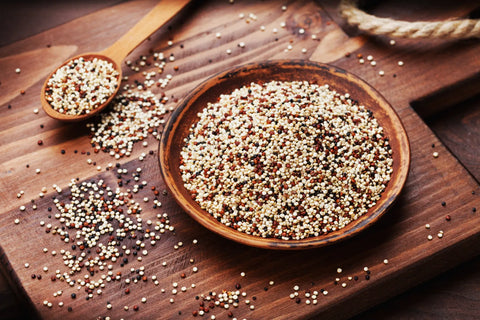
How Much Protein Should a Dog Have Daily?
Protein is a vital part of our dogs’ diets, playing a crucial role in their overall health and well-being. Just like us, dogs need protein to build strong muscles, maintain healthy skin and coats, and support their immune systems.
But how much protein does your dog actually need each day? It's a common question among pet owners who want to ensure their dogs are getting the best nutrition possible.
Understanding your dog's protein requirements can be a bit tricky because it varies based on factors like age, activity level, and breed. In this article, we'll break down everything you need to know about daily protein intake for dogs, including recommended amounts, sources of protein, and how to spot signs of deficiency or overconsumption.
By the end, you'll have a clear understanding of how to keep your pup healthy and thriving with the right amount of protein.
What Factors Influence Dogs’ Protein Requirements?
Understanding how much protein your dog needs daily requires considering several factors that influence their dietary requirements.
Let’s dive into the key aspects that determine your dog's protein needs.
Age and Life Stage
Just like humans, dogs' nutritional needs change as they grow. Puppies, for example, are in a rapid growth phase and require more protein to support their developing muscles and organs. Generally, a puppy's diet should consist of about 22 to 32% protein.
Adult dogs, on the other hand, need sufficient protein to maintain their body condition and overall health, typically around 18 to 25%. Senior dogs might have different needs, and they often need a moderate protein intake to support muscle mass while avoiding strain on aging kidneys.
Activity Level
A dog’s activity level also significantly impacts their protein requirements. Highly active dogs (think working dogs or those regularly participating in sports) need more protein to fuel their energy expenditure and muscle repair. These dogs might benefit from a diet with protein levels on the higher end of the spectrum.
On the other hand, less active or sedentary dogs require less protein to prevent unnecessary weight gain and potential health issues. For these dogs, maintaining a balanced diet with adequate but not excessive protein is key.
Breed and Size
Breed and size also influence your dog’s protein needs. Large breeds, like Great Danes or German Shepherds, have different metabolic rates and growth patterns than smaller breeds like Chihuahuas or Dachshunds.
Large breeds may require diets with moderate protein levels to support their larger muscle mass without overloading their systems. Small breeds, though smaller in size, often have faster metabolisms and might need higher protein percentages relative to their body weight to stay energetic and healthy.
Health Conditions and Special Needs
Certain health conditions can also affect your dog's protein requirements. For example, dogs with kidney disease may need lower protein diets to reduce strain on their kidneys, while those recovering from injury or illness might require higher protein intake to aid in healing and recovery. That said, it’s always a good idea to talk with a veterinarian to tailor your dog's diet to their specific health needs.
What Is the Recommended Daily Protein Intake for a Dog?
Determining the right amount of daily protein for your dog involves understanding general guidelines and tailoring them to your dog's specific needs. This section will take a closer look at the recommended daily protein intake for dogs based on expert recommendations and standards.
General Guidelines From Veterinary Experts
Veterinary experts generally recommend that adult dogs should get about 18 to 25% of their daily caloric intake from protein. Puppies, due to their rapid growth, typically need more, around 22 to 32% protein. Senior dogs may benefit from a protein range similar to adults but should be monitored for any health conditions that might alter their needs.
Standards From Dog Food Authorities
Two primary organizations set nutritional standards for pet food: the Association of American Feed Control Officials (AAFCO) and the National Research Council (NRC).
Both organizations provide detailed guidelines on protein requirements, which we’ve listed below:
- AAFCO: According to AAFCO, adult maintenance dog food should contain at least 18% protein on a dry matter basis, while growth and reproduction stages (puppies and pregnant/lactating dogs) require at least 22%.
- NRC: The NRC suggests slightly different numbers, but the general consensus aligns closely with AAFCO, and they emphasize the importance of high-quality protein sources for overall health.
Daily Protein Amounts Based on Dog's Weight
To translate these percentages into practical feeding amounts, let’s consider your dog's weight:
- Small Breeds (up to 20 lbs): These dogs typically need about one gram of protein per pound of body weight per day. For a 15-pound dog, this equates to around 15 grams of protein daily.
- Medium Breeds (20 to 50 lbs): Medium-sized dogs might require slightly less protein per pound due to their metabolism efficiency, averaging around one gram per pound. A 35-pound dog would need approximately 28 to 35 grams of protein each day.
- Large Breeds (50 lbs and above): Larger dogs need around 0.6-0.8 grams of protein per pound. For a 70-pound dog, this means 42 to 56 grams of protein daily.
What Are Different Sources of Protein for Dogs?
A big part of making sure your dog gets the right amount of protein also involves selecting high-quality protein sources. Animal-based proteins are generally considered the best due to their complete amino acid profiles and high digestibility.
Chicken, beef, pork, and turkey are common protein sources in dog food that provide essential amino acids that are easily absorbed (your pup can try all four with our Sampler Pack). Salmon, whitefish, and other fish are also high in protein and rich in omega-3 fatty acids, which support skin and coat health.
In terms of non-meat options, eggs are a highly digestible protein source and contain essential vitamins and minerals. Cottage cheese and yogurt can be good protein sources, but only if your dog isn’t lactose intolerant. Ingredients like peas, lentils, and chickpeas can supplement protein intake, though they should not be the sole source due to their incomplete amino acid profiles.
Combining these protein sources guarantees a balanced diet that will support your pup’s muscle development, energy levels, and overall health.
What Are Signs of Protein Deficiency and Overconsumption?
Balancing protein intake is crucial for your dog's health. Both deficiency and overconsumption can lead to serious health issues. In this section, you’ll learn a bit about how to identify either condition in your dog.
Protein Deficiency
Signs of protein deficiency include:
- Weight Loss: Unexplained weight loss can indicate insufficient protein intake.
- Poor Coat Condition: A dull, brittle coat and excessive shedding are common signs of protein deficiency.
- Weakness and Fatigue: Protein is essential for energy, so a deficiency can cause lethargy.
- Slow Growth: In puppies, insufficient protein can lead to stunted growth and developmental issues.
- Frequent Infections: Protein supports the immune system; a deficiency can make dogs more susceptible to illnesses.
Protein Overconsumption
While protein is vital, too much can be harmful. Some of the signs of protein overconsumption are:
- Kidney Strain: Excessive protein can strain the kidneys, especially in older dogs or those with pre-existing kidney conditions.
- Weight Gain: High-protein diets can lead to obesity if your dog is eating more calories than they burn.
- Digestive Issues: Overeating protein can cause digestive upsets, including diarrhea and bloating.
Monitoring your dog's protein intake and keeping an eye out for these signs can help maintain their health and well-being. Always consult a veterinarian to determine the optimal protein levels for your dog.
Wrapping Up
At A Pup Above, we believe that ensuring your dog gets the right amount of high-quality protein is key to their health and vitality. By understanding their specific needs and choosing the best sources, you can keep your dog happy, healthy, and full of energy.
Remember, when in doubt, always tailor their diet with expert guidance.
Sources:
AAFCO Dog and Cat Food Nutrient Profiles | AAFCO
Can Dogs Eat Eggs? What to Know About Feeding Your Dog Eggs | American Kennel Club
Top Stories

Why Do Dogs Lick Their Paws?

Why Do Dogs Whimper & Make Noises in Their Sleep?

Healthy Vet-Approved Homemade Dog Food Recipes

How To Cook Sweet Potatoes for Dogs






















